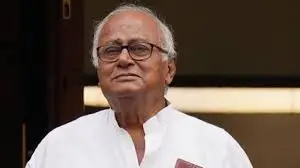TMC MP faces protest, BJP seeks expulsion of Congress MP over remarks on Op Sindoor, Pahalgam

Political tensions have soared recently due to controversial remarks concerning Operation Sindoor and the Pahalgam terror attack. These comments sparked protests and demands for disciplinary action against key politicians.
Protests Against TMC MP in West Bengal
In West Bengal, a Trinamool Congress (TMC) MP faced protests from local groups. The protesters accused the MP of making statements insensitive to national security. This protest reflects a rising frustration among citizens over political comments amid ongoing counter-terror efforts.
The protestors expressed their disappointment openly, urging political leaders to support India’s anti-terror operations fully. The TMC MP’s remarks triggered outrage across the state, highlighting the growing divide in political opinions about national security.
BJP Seeks Expulsion of Congress MP Saugata Roy
The BJP has strongly criticized Congress MP Saugata Roy for his recent comments on Operation Sindoor. Roy had referred to the India-Pakistan conflict as “insignificant” and questioned the Indian government’s claims regarding the operation.
Roy’s remarks came shortly after India launched Operation Sindoor. This military action targeted terror camps in Pakistan-occupied Kashmir. The strikes followed the deadly Pahalgam attack, where 26 civilians lost their lives.
BJP leaders labeled Roy’s comments as unpatriotic and damaging to national security. They demanded his immediate expulsion from the Congress party. The BJP accused Roy of undermining the country’s efforts against terrorism.
What is Operation Sindoor?
Operation Sindoor is India’s counter-terror campaign launched in response to the Pahalgam attack. It aimed to dismantle terror infrastructure across nine sites in Pakistan and Pakistan-occupied Kashmir.
The operation received support from several political factions. Many hailed it as a strong, necessary response to terrorism. However, some opposition leaders questioned its timing and the decision to proceed without international mediation.
The Indian government has maintained that the strikes were carefully planned and targeted only terrorist bases. Officials said the operation was crucial to ensuring the safety of civilians and national security.
Controversy Over BJP Minister’s Remarks
The political storm intensified when Madhya Pradesh BJP Minister Kunwar Vijay Shah referred to Colonel Sofia Qureshi, a key figure in Operation Sindoor, as “the sister of their community.”
Congress leaders condemned this remark as communal and sexist. They called for Shah’s removal from the state cabinet. The controversy led to a court order, and an FIR was filed against the BJP minister.
The statement sparked a debate on the role of identity politics in the handling of national security issues. Many saw the comment as an attempt to politicize and communalize a sensitive military operation.
Political Reactions and Diplomatic Moves
India’s government is taking active diplomatic steps following the Pahalgam attack and Operation Sindoor. It plans to send all-party delegations of Members of Parliament to key global capitals.
The goal is to build international support for India’s counter-terrorism efforts. Officials hope these visits will strengthen diplomatic ties and foster global solidarity.
Meanwhile, political parties continue to debate the national security situation. The BJP emphasizes a hardline stance against terrorism. The Congress has raised questions about the timing and international impact of India’s military actions.
The Pahalgam Attack: A Tragic Trigger
The Pahalgam terror attack shook the nation. It resulted in the death of 26 innocent civilians. This tragedy was the immediate trigger for Operation Sindoor.
The attack caused widespread anger and grief. It also intensified calls for a firm response to cross-border terrorism.
In the aftermath, India’s military struck terror camps with precision. The strikes aimed to prevent future attacks and dismantle terrorist networks.
Deep Divisions in Political Narratives
The political discourse around Operation Sindoor and the Pahalgam attack exposes deep divisions. Some parties focus on national security and strong military action. Others question the approach and seek more diplomatic solutions.
These differing views reflect broader political rivalries and strategies. They also influence public opinion on the government’s handling of terrorism.
The controversy has heightened political polarization. It shows how security issues can become entangled with party politics.
What Lies Ahead?
The coming weeks promise further debates and political activity. Parties will continue to press their positions on Operation Sindoor and the Pahalgam attack.
The government will likely maintain its diplomatic outreach abroad. It hopes to build a united international front against terrorism.
Meanwhile, political leaders must navigate the delicate balance between security concerns and public sentiment.
Conclusion
The recent protests and political clashes highlight the complex nature of India’s fight against terrorism. Operation Sindoor, launched after the tragic Pahalgam attack, remains a focal point of national debate.
As political parties spar over narratives and actions, the country watches closely. The need for unity and clear communication has never been more urgent in protecting India’s security and sovereignty.






